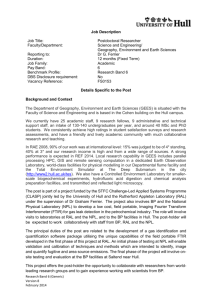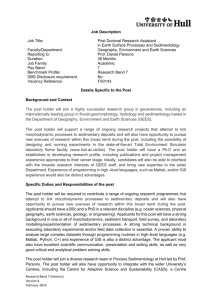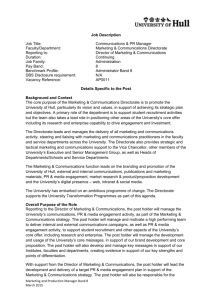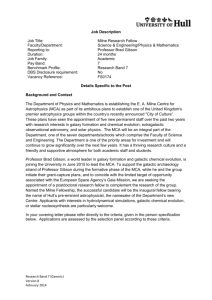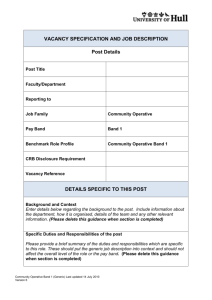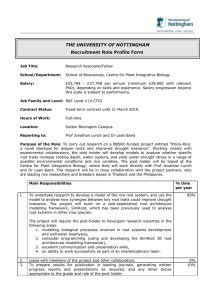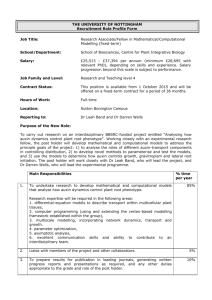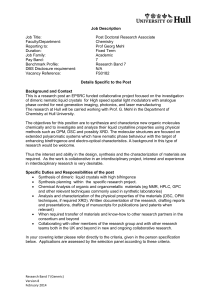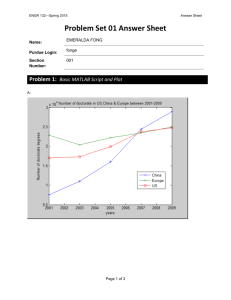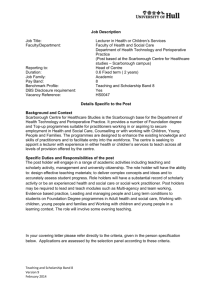Job Description - Jobs at the University of Hull
advertisement
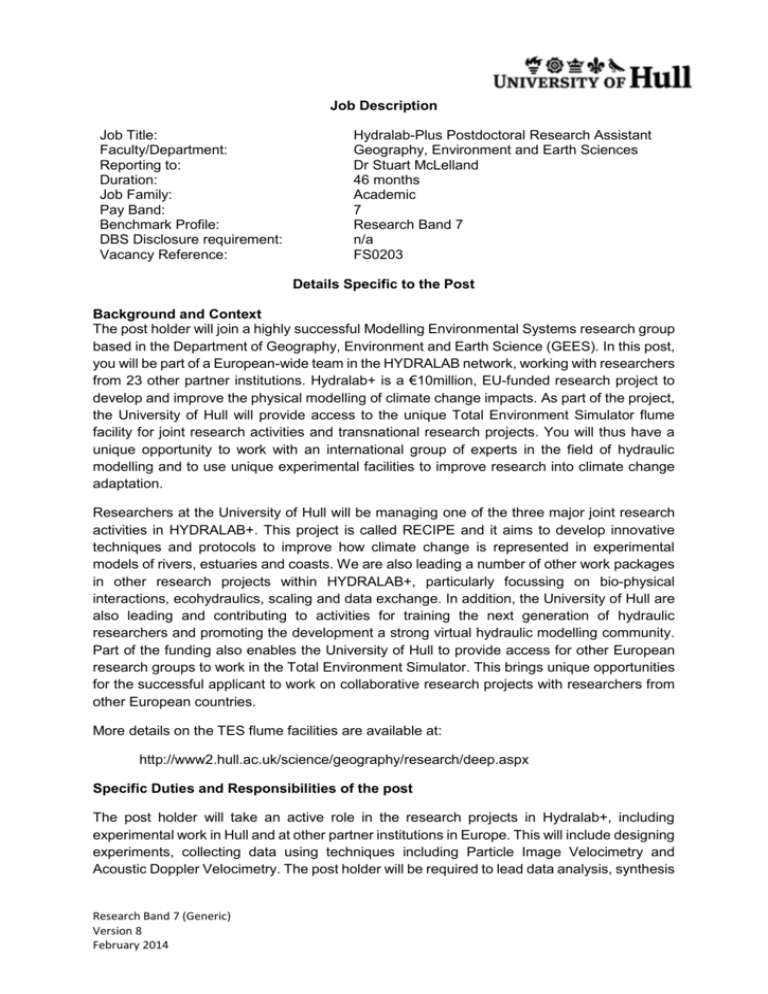
Job Description Job Title: Faculty/Department: Reporting to: Duration: Job Family: Pay Band: Benchmark Profile: DBS Disclosure requirement: Vacancy Reference: Hydralab-Plus Postdoctoral Research Assistant Geography, Environment and Earth Sciences Dr Stuart McLelland 46 months Academic 7 Research Band 7 n/a FS0203 Details Specific to the Post Background and Context The post holder will join a highly successful Modelling Environmental Systems research group based in the Department of Geography, Environment and Earth Science (GEES). In this post, you will be part of a European-wide team in the HYDRALAB network, working with researchers from 23 other partner institutions. Hydralab+ is a €10million, EU-funded research project to develop and improve the physical modelling of climate change impacts. As part of the project, the University of Hull will provide access to the unique Total Environment Simulator flume facility for joint research activities and transnational research projects. You will thus have a unique opportunity to work with an international group of experts in the field of hydraulic modelling and to use unique experimental facilities to improve research into climate change adaptation. Researchers at the University of Hull will be managing one of the three major joint research activities in HYDRALAB+. This project is called RECIPE and it aims to develop innovative techniques and protocols to improve how climate change is represented in experimental models of rivers, estuaries and coasts. We are also leading a number of other work packages in other research projects within HYDRALAB+, particularly focussing on bio-physical interactions, ecohydraulics, scaling and data exchange. In addition, the University of Hull are also leading and contributing to activities for training the next generation of hydraulic researchers and promoting the development a strong virtual hydraulic modelling community. Part of the funding also enables the University of Hull to provide access for other European research groups to work in the Total Environment Simulator. This brings unique opportunities for the successful applicant to work on collaborative research projects with researchers from other European countries. More details on the TES flume facilities are available at: http://www2.hull.ac.uk/science/geography/research/deep.aspx Specific Duties and Responsibilities of the post The post holder will take an active role in the research projects in Hydralab+, including experimental work in Hull and at other partner institutions in Europe. This will include designing experiments, collecting data using techniques including Particle Image Velocimetry and Acoustic Doppler Velocimetry. The post holder will be required to lead data analysis, synthesis Research Band 7 (Generic) Version 8 February 2014 and dissemination of research through reports and high-impact international peer-reviewed journal papers. As part of the networking activities in HYDRALAB+ the successful applicant will participate in regular meetings with partners and contribute to projects that develop a virtual ‘hydralab community’, enhance links with instrument manufacturers and hydraulic research communities and also contribute to foresight studies and training workshops. As part of the Access projects you will assist with experiments undertaken in collaboration external research groups. This will include data collection and processing and a contribution to dissemination. Applicants for this post will have a strong background and experience of hydraulics or ecohydraulics and/or physical modelling, and a broad understanding of flow measurement techniques. A strong technical background in turbulent flow and/or sediment dynamics is essential alongside an ability to analyse large, complex datasets. Experience of flow visualisation is also an advantage. The post holder must have excellent scientific communication, presentation and writing skills, as well as very good critical and analytical problem solving skills. The post holder will also have opportunity to integrate with the wider University research themes, including those related to marine science and energy and the environment. In your covering letter please refer directly to the criteria, given in the person specification below. Applications are assessed by the selection panel according to these criteria. Research Band 7 (Generic) Version 8 February 2014 GENERIC JOB DESCRIPTION The job duties and responsibilities listed below are intended to describe the general nature of the role. The duties and responsibilities and the balance between the elements in the role may change or vary over time depending on the specific needs at a specific point in time or due to changing needs in the department. Candidates should note that there may not be an immediate requirement to carry out all the activities listed below. Overall Purpose of the Role The researcher at this level will be: An experienced and professional researcher and will be a subject specialist, drawing upon knowledge gained from postgraduate research and/or working within a Research Band 6 role. Associated with a particular project (or projects) and will contribute ideas, and/or enhancement of techniques or methodologies and be expected to take significant initiatives in their work and consult with the Principal Investigator over the details of the project. They will work under supervision and receive academic, pastoral support and guidance which may include specific training, career opportunities and mentoring. They may contribute to the Department’s teaching, through supervision of projects, overseeing practical classes, or taking small group tutorial classes. The main focus of the work will involve conducting individual and collaborative research projects under the general guidance of a senior academic or Principal Investigator using new research techniques and methods, analysing and interpreting data and writing up research for publication. Main Work Activities 1. Conduct individual and collaborative research projects to include: Using expertise to carry out projects they are working on. Contribute to the preparing proposals and applications for external bodies, e.g. for funding and contractual purposes with appropriate support or contribute to the writing of collective bids. Use new research techniques and methods. Analyse and interpret research data. Write up research work of the project and its dissemination through seminar and conferences presentations and publications. 2. Responsible for the management of projects to include: Plan and manage own research activity in collaboration with others. Manage administrative activities with guidance if required. Plan and monitor the work of the project or projects if applicable. 3. Assist with teaching and learning support in own area of study to include: Assist in the development of student research skills. Assess student knowledge and supervision of projects. Supervise and guide final year students. 4. Develop and initiate collaborative working internally and externally to include: Build internal contacts and participate in internal networks for exchange of information and to form relationships for future collaboration and to progress their research. Research Band 7 (Generic) Version 8 February 2014 Develop links and join external networks to share information and identify future potential sources of funding. Work with colleagues on joint projects as required. Attend and contribute to relevant meetings. 5. Demonstrate evidence of own personal and professional development to include: Continually update knowledge and understanding in field or specialism. Appraisal, induction and performance reviews. Participate in training and development activity. Maintain links with professional institutions and other related bodies. Collaborate with academic colleagues on areas of shared research interest. Additionally the post holder will be required to: Fulfil the employees’ duties described in the University’s health and safety policies and co-operate with the health and safety arrangements in place within the department. May be required to undertake specific health and safety roles on request e.g. Display screen equipment assessor, departmental safety officer, fire warden etc. Show a commitment to diversity, equal opportunities and anti-discriminatory practices this includes undertaking mandatory equality and diversity training. Comply with University regulations, policies and procedures. Research Band 7 (Generic) Version 8 February 2014 PERSON SPECIFICATION – Research Band 7 Specification Essential Desirable Education and Training Formal qualifications and relevant training Work Experience A PhD or equivalent in relevant discipline Training in computer programming or data visualisation (e.g. Matlab) Evidence of: Experience of physical modelling or field measurements An emerging track record in an appropriate research field, including scientific publications, presentations at scientific conferences and contributing to grant applications Evidence of: Participation in networks that seek to promote research collaboration Familiarity with the analysis of flow or sediment transport data Ability to undertake duties of the post Skills and Knowledge Includes abilities and intellect Personal Qualities Includes any specific physical requirements of the post – (subject to the provisions of the Equality Act 2010) Research Band 7 (Generic) Version 8 February 2014 An expectation to positively contribute to Department/University activities and initiatives (e.g. Science Festivals) Show evidence of collaborative working, particularly on interdisciplinary activities Evidence of working in an open and transparent way, providing information and communicating effectively with colleagues Record of designing, planning and implementing field or laboratory experiments Experience in ecohydraulics Experience of flow measurement techniques (e.g. PIV, LDA or ADV) Experience in processing large data sets Effective management of resources Engagement with social media and interest in virtual learning environments Ability to work long hours unsupervised during experiments Evidence of taking initiative within a scientific setting Evidence of Continuous Professional Development Examples Measured by Application Interview Application Interview Application Interview Interview
